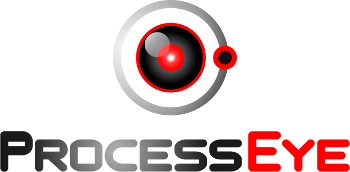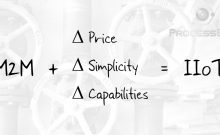* Originally published by Kent Herbst, President of ProcessEye, on LinkedIn.
There’s a lot of discussion about artificial intelligence and technology, in general, that gets people wondering and questioning…”Will I lose my job to technology?” While this question is rooted in the fear of the unknown, we can look back on technical advances through the years as an indicator. Things like personal computers or cell phones definitely caused disruptions. While computers and cell phones disrupted the world, they resulted in generally more, not less, human input. Now this isn’t always the case (i.e. robotics in manufacturing) but my general answer to the question “Will I lose my job to technology?” would be “No.”
However, technology will typically result in significant change for individuals and organizations. While my general answer before was “No, you won’t lose your job to technology,” it is a function of your willingness to change. This goes beyond individuals to organizations, as well. An unwillingness to change or adapt will leave individuals and organizations irrelevant and replaceable. Below are 3 areas in which I believe we will see rapid changes:
“An unwillingness to change or adapt will leave individuals and organizations irrelevant and replaceable.”
1) Proactive vs. Reactive
Historically, organizations and individuals have managed things in a reactive manner. Monthly, quarterly and annual reports are the go-to method of seeing how things are going. It’s these types of reports that are the basis for decisions made and actions taken in the upcoming weeks, months and years.
As technology advances, it is becoming simpler and more cost-effective to get information sooner. Platforms are able to role this information up daily, hourly or real-time so corrective and proactive actions can be taken early without the need to wait a long period of time. This results in greater organizational transparency and efficiencies that manifest themselves in a wide variety of scenarios.
So, whether you are in purchasing, sales, manufacturing or service, you will most likely see strong trends in actions based on predictive insight. This proactive approach will lend itself to a more relaxed and predictable work environment, something most people will find preferrable.
2) Broader, Yet Specialized
Currently, without a lot of data, it’s difficult to really analyze a situation in great detail. If you’re in supply chain management, you may know how much you spend with each vendor but you might not be able to understand why or what the future looks like. If you’re in marketing, you may know how much revenue you’ve recognized by a good or service but you may not know where you’re missing out on additional opportunities.
We have seen, and will continue to see, rapid changes in actionable insight in a wide variety of areas. Individuals will be able to broadly analyze, across their entire organization, data in specific areas and gain valuable insight. For example, a chemical supply company will be able to monitor their inventory and usage levels across thousands of tanks and identify the abnormalities in usage rates. Supply chain, manufacturing and logistics departments will have visibility into predicted usages and be able to plan accordingly. Until recently, the technology that allowed for this degree of insight was too cost prohibitive. However, advancements in sensors, devices and software platforms are enabling simpler, cost-effective specialization in particular areas.
What you will see will be a trend in job functions covering broader areas of companies. While the duties will be more global in nature, they will be refined to managing specific, actionable insights. The results will be employees having a greater sense of direct impact on the success of an organization, no matter its size.
3) Answering "Why"
While sometimes a “gut feel” is good and required, I have often found that it can be an indicator of laziness. “Gut feel” can be a cover for “I’m too lazy to really understand why something is the way it is.” The danger of “gut feel” is that individuals and organizations can’t truly answer “why” things are the way they are. Without an understanding of “why” things are currently the way they are, decisions and actions are likely to be inefficient and fruitless.
“Gut feel” can be a cover for “I’m too lazy to really understand why something is the way it is.”
Take preventative maintenance for example. A massive amount of money is being wasted on doing maintenance because someone had a “gut feel” that changing belts needed to be done annually or that filters needed to be changed quarterly. Why have this frequency? Why not change the frequency? Predictive maintenance technologies will get simpler and more cost-effective, thereby enabling individuals and organizations to answer the “why” in order to improve efficiencies.
Being able to answer “why” can actually lead to more employee ownership. Many employees don’t really understand “why” in many cases, and this is usually because the management doesn’t understand the answer to “why” either. Without this understanding, employees are left feeling that the tasks they are completing are mundane and that they can’t have any impact on the success of their organization. In a way, answering “why” can lead to the feeling of purpose within an organization and a more engaged workforce.






